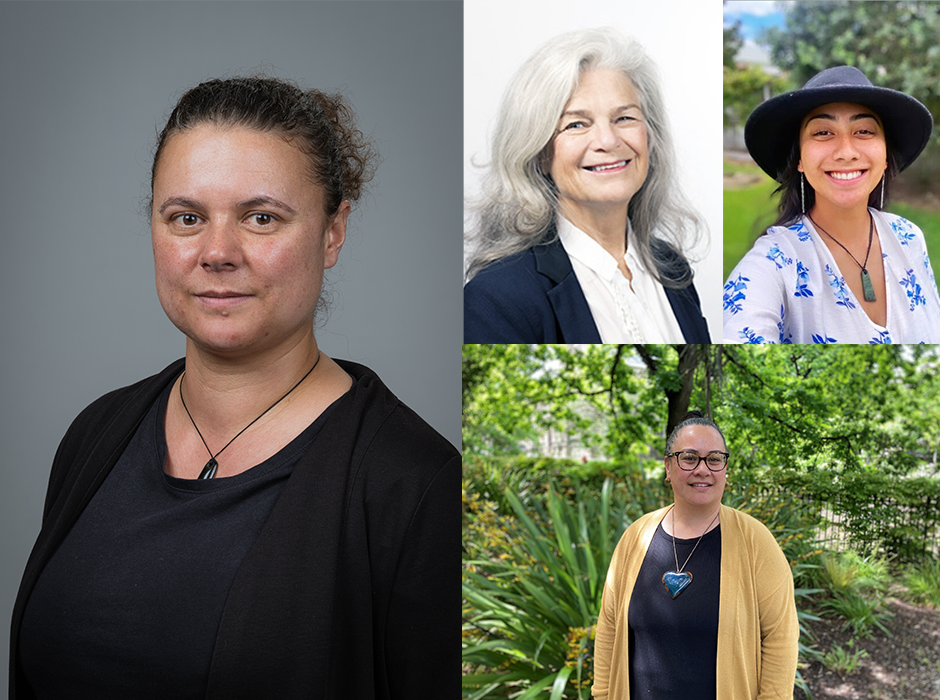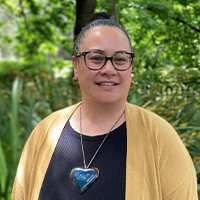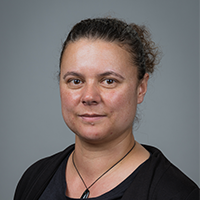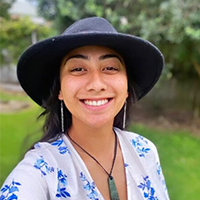
Clockwise from left Dr Julia Wilson, Dr Christine Winter, Tautemaria Silva and Dr Wahineata Smith are recipients of Te Poutama Māori Advancing Research Collaboration Grants.
Te Kete Aronui Division of Humanities received three of the six annual Te Poutama Māori Advancing Research Collaboration Grants.
Dr Wahineata Smith (Ngāti Korokī Kahukura, Waikato, Ngāti Ranginui), Dr Julia Wilson (Te Arawa), Tautemaria Silva (Waikato, Ngāpuhi) and Dr Christine Winter (Ngati Kahungunu ki Wairoa) have received support for projects spanning the use of te reo in tertiary learning, Māori perspectives in multispecies justice and moko kauae traditions.
Te Poutama Māori is the collective representative body of Māori academic staff at the University of Otago. These grants support the development or strengthening of research collaborations specific to Māori researchers and research.
He tāngia moko kauae ki tā Ngāti Korokī Kahukura, he tānga manawa kia whakaora ai anō

Dr Wahineata Smith
Dr Wahineata Smith (Ngāti Korokī Kahukura, Waikato, Ngāti Ranginui) is a Lecturer in Te Tumu - School of Māori, Pacific and Indigenous Studies.
Dr Smith’s research has the working title He tāngia moko kauae ki tā Ngāti Korokī Kahukura, he tānga manawa kia whakaora ai anō, which loosely translates as Moko kauae of Ngāti Korokī Kahukura, a forgotten tradition to be rediscovered.
This is a collaboration with a Waikato iwi, Ngāti Korokī Kahukura, to explore the traditional narratives and practices of moko kauae and give voice to the resurgence of those practices and traditions in Ngāti Korokī Kahukura. The collaborative nature of the research is also giving mana to the iwi to shape the methodology and the kōrero that will be shared and published.
“This kaupapa is important to me as it’s imperative that research is reflective of society and conducted with the researched community at the core,” says Dr Smith
“This research will also give voice to rūruhi and wāhine of Ngāti Korokī Kahukura to share their personal journeys with moko kauae.”
Dr Smith has recently moved to Ōtepoti from the Waikato. She says that as well as informing her teaching in Te Tumu and strengthening her skills and experience when supervising postgraduate students, this research is a vehicle for her to stay connected to her iwi, her identity and her wellbeing while living in Ōtepoti.
Manaakitia te Reo: Identifying practices and aspirations of staff and students for a te-reo-positive university

Dr Julia Wilson
Dr Julia Wilson (Te Arawa) and Tautemaria Silva (Waikato, Ngāpuhi) are both Teaching Fellows with Mātai Tikaka Takata - Social Anthropology, and the co-primary investigators on the research project Manaakitia te Reo: Identifying practices and aspirations of staff and students for a te-reo-positive university.
Flynn Macredie (Waikato) is an Associate Research Fellow with the project, and Associate Professor Karyn Paringatai (Ngāti Porou) a mentor.
All New Zealand universities have a policy regarding the use of te reo Māori in assessment, however, there is currently very little published on either student or staff perspectives on these processes.
“While we have very different experiences of learning te reo, we are both in the first generation of our family to do so following the active repression of te reo in the past. Hence, for us, this project is a way to contribute to the broader language revitalisation efforts,” Dr Wilson says.

Tautemaria Silva
“In te reo Māori, the word 'māori' means 'ordinary, normal or common'. So, long-term, we would like to see the use of te reo normalised, so that te reo Māori is also te reo māori.
Dr Wilson and Silva have many questions related to this kaupapa but want to start by talking with select staff and Māori students' association representatives about what is currently happening at the University of Otago and what they would like to see happening.
They are particularly interested in talking to Māori staff, staff that can speak te reo Māori and staff that have received requests from students to submit assignments in te reo, to hear about the various formal and informal things they have been doing to encourage te reo use.
They will be contacting staff in the first half of next year, and also welcome correspondence from anyone interested in this kaupapa.
Māori protocols of multispecies justice

Dr Christine Winter
Dr Christine Winter (Ngati Kahungunu ki Wairoa), Tōrakapū - Politics, has received support for her project Māori protocols of multispecies justice.
“Multispecies justice is an examination of how political theorists include the non-human realm within the spheres of justice,” Dr Winter says.
“This is regarded as a ‘new thing’ in political theory and I am constantly arguing that it is not new. Indigenous communties have been doing this and thinking about this for centuries, as have people’s white ancestors but it got stomped out. It is new to post-enlightenment communities and political thinking.”
With this funding support, Dr Winter will look for expressions of multipecies justice in some of the early recordings of Māori protocols in petitions to Government, in the Archives of New Zealand, Waitangi Tribunal submissions, the National Library and, if possible, the Parliamentary Library.
“I am seeking how our tupuna expressed justice for the natural realm. I think it is slightly different to kaitiakitanga, which is more of a custodianship but I want to see if that distinction does actually lie in the material.”
Dr Winter explains that multispecies justice seeks to extend the duties and responsibilties of justice to the environment itself, rather than conceiving it as only an inter-human set of responsibilites: “If you think about theories of environmental justice, that’s about protecting the environment for people, or people from environmental bads.”
“It is also important to emphaise that people are included in multispecies justice - this not at the expense of social justice, rather it is intimately entangled.”
This research will inform Dr Winter’s contributions to two groups she is involved with, working through what the duties and responsibilties of multispecies justice might be. “If there are clear precendents, that help thinkers think through how to model multispecies justice contemporary political arrangements.”
She is writing with colleagues in the Multispecies Justice Collective writing a book on institutionalising multispecies justice within political units, such as municipalties and national politics.
The other is an international group drawn from a range of disciplines, holding a series of workshops to craft a model multispecies constitution.
“It’s exciting to be in this interdisciplinary community all bringing different strengths and viewpoints, thinking through how to operationalise very future focussed actions. This is very much about how to guide societies towards more capacious notions of justice.”
Dr Winter says it is “absolutely brilliant to get this support” and she is incredibly grateful to Te Poutama Māori. She also thanks the Division of Humanities research advisors, Natalie Harfoot and Michelle Walker. “I am sure their last minute interventions made all the difference.”